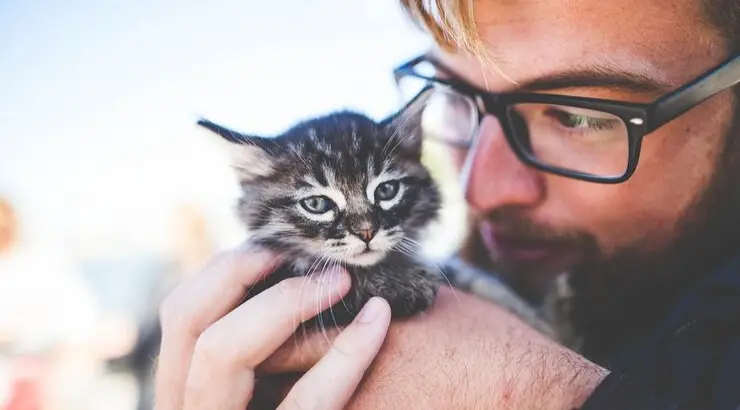Animals
Cats Think of Their Owner Like a Parent, Even If They Don’t Act Like It
A new study has found that cats think of their owners similar to the way children think of their parents.

(TMU) — We’ve all known someone who refers to their cat as their “baby,” pampering and nurturing their feline friend as if it were their own human son or daughter.
For the skeptics among us—perhaps those of us who lack pets—the idea may seem absurd on the face of it. After all, cats especially have a pretty solid reputation as being somewhat avoidant, independent, and flipping between affectionate and standoffish.
However, new research published in the journal Current Biology shows that the idea that feline pets are distant is actually an “unfair myth” because cats actually do reciprocate human feelings of comfort and security toward their owners.
The study by scientists at Oregon State University even found that cats—not unlike dogs or even baby children—form attachments to humans known as “secure attachment,” when a caregiver’s presence gives them the feeling of calm and security.
The idea shouldn’t strike any cat lover by surprise—after all, why else would cats stress out so loudly whenever their owner has to go to work or otherwise leave home for the night?
Dr. Kristyn Vitale, the lead study author and a researcher at Oregon State University’s Human-Animal Interaction Lab, explained:
“Like dogs, cats display social flexibility in regard to their attachments with humans.
The majority of cats are securely attached to their owner and use them as a source of security in a novel environment.”
During the study, researchers used a range of situation tests designed during the 1970s to evaluate the bonds between parents and infant.
Rather than testing the relationships between humans, the scientists instead tested the relationship between 108 cats and their owners. The cats included 38 adults and 70 kittens.
When suddenly left alone, the majority of cats reacted much in the same way as children or dogs would when they suddenly find themselves left alone.
During the course of the study, 70 of the cats were placed in an unfamiliar room with their owners for two minutes, after which the owner then departed for two more minutes before returning.
Researchers noted how 64.3 percent of the cats revealed the signs of “secure attachment”—meaning that when their owners returned, the cats became relaxed and divided their time between exploring their surroundings and seeking their owners’ attention.
However, cats can also behave in an ambivalent fashion toward their owners—which is when they come off as less than secure—twitching their tails, licking their lips, avoiding their owner altogether or simply jumping in their laps and not moving, revealing an attitude of ambivalence. In that case, the attachment is insecure.
Kristyn Vitale said:
“Once an attachment style has been established between the cat and its caregiver, it appears to remain relatively stable over time, even after a training and socialization intervention.
Cats that are insecure can be likely to run and hide or seem to act aloof.
There’s long been a biased way of thinking that all cats behave in this way but the majority of cats use their owner as a source of security.
Your cat is depending on you to feel secure when they are stressed.”
Vitale explained to NBC News that secure cats tend to greet their owner and then go about their business, which is “how a secure human also behaves.”
The new research shows how reliant feline pets are on their owners’ own behavior when it comes to sustaining their own emotional needs.
Vitale said:
“It’s important for owners to think about that. When they’re in a stressful situation, how they’re behaving can actually have a direct impact on their cats’ behavior.”
The study comes months after findings were released earlier this year that found that cats understand when their name is called out—even if, in typical cat fashion, they choose to ignore us.
By Elias Marat | Creative Commons | TheMindUnleashed.com
Typos, corrections and/or news tips? Email us at Contact@TheMindUnleashed.com
